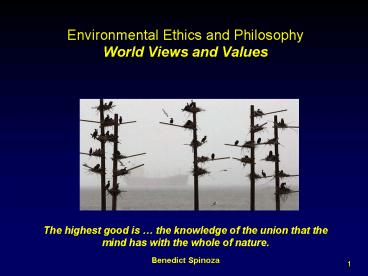Environmental Ethics and Philosophy World Views and Values - PowerPoint PPT Presentation
1 / 14
Title:
Environmental Ethics and Philosophy World Views and Values
Description:
the knowledge of the union that the mind has with the whole of nature. Benedict Spinoza ... Biocentric - all living things have intrinsic values and rights. ... – PowerPoint PPT presentation
Number of Views:248
Avg rating:3.0/5.0
Title: Environmental Ethics and Philosophy World Views and Values
1
Environmental Ethics and PhilosophyWorld Views
and Values
The highest good is the knowledge of the union
that the mind has with the whole of
nature. Benedict Spinoza
2
INTRODUCTION
- Ethics is a branch of philosophy
- Morals Distinction between right and wrong.
- Values Ultimate worth of actions or things.
- Environmental ethics deals with the moral
relationships between humans and the surrounding
world. It also deals with the responsibilities of
the present human generation to future
generations of people other species to ensure
that the world will continue to function in an
ecologically healthy way.
3
Intrinsic and Instrumental Value
- Intrinsic (Inherent - Innate) - Worth or value
simply because of existence. - Humans
- Instrumental (Conferred) - Worth or value only
because they are valued by someone who matters. - Tools
- Water
- Fish Animals
4
Values, Rights, and Obligations
- Moral Agents - Beings capable of acting morally
or immorally, and who can accept responsibility
for their acts. - Humans
- Moral Subjects - Beings who are not moral agents,
but who have moral interests and can be treated
rightly or wrongly. - Children
- Moral Extensionism - Widening definition of who
is considered ethically significant. - Animal Rights
5
WORLD VIEWS
- Comprehensive philosophies of human life the
universe as well as the relationship between
humans and the natural world. - Example traditional religion belief systems.
6
PHILOSOPHICAL PERSPECTIVES ON THE ENVIRONMENT
- Anthropocentric - Human-centered.
- Ex more worthy, disconnected from nature
- Stewardship - Custodian of resources.
- Indigenous peoples
- Biocentric - all living things have intrinsic
values and rights. - - Ex humans are unique (but no more worthy
than other species rejects speciesism) - Ecocentric direct indirect connections
amongst species within ecosystems to be
invaluable. - Biogeochemical cycles (rocks, soil, water)
7
CBC Canadian Case
- The Fur Industry
- Do you think that it is OK to wear garments made
of or decorated with fur or leather, even though
there are suitable synthetics that could be
substituted for most uses of these materials? If
you think that it is acceptable to wear fur or
leather, then explain why. If not, why not?
8
SCIENTIFIC METHOD
9
- The Scientific Method is a way for us to DO
science. It helps us to answer questions about
the world around us. - It has six parts
- - Observing
- - Hypothesizing Predicting
- - Experimenting
- - Organizing Interpreting Data
- - Using Graphs Sharing Information
- - Communicating Results (Conclusions)
10
Scientific Investigation
11
Science as a Way of Knowing
- Deductive Reasoning - Starts with a general
principle and proceeds to a specific case. - Inductive Reasoning - General principles are
inferred from examination of specific cases.
12
Paradigms
- Most research is based on commonly shared
paradigms - models that provide a framework for
interpreting results. - Eventually, anomalies and contradictions of
paradigms arise and build. - Typically new generations of scholars challenge
old paradigms and formulate new hypotheses and
theories leading to new paradigms.
13
Technology and Progress
- Progress usually defined by increase in wealth
and standard of living but often at the cost of
pollution, rapid urbanization and poor working
conditions, income disparity, social and
environmental problems. - Luddites - oppose rampant use of technology
- Neo-Luddites suggest science and technology
cause major problems and we should abandon
modern life
14
(No Transcript)































